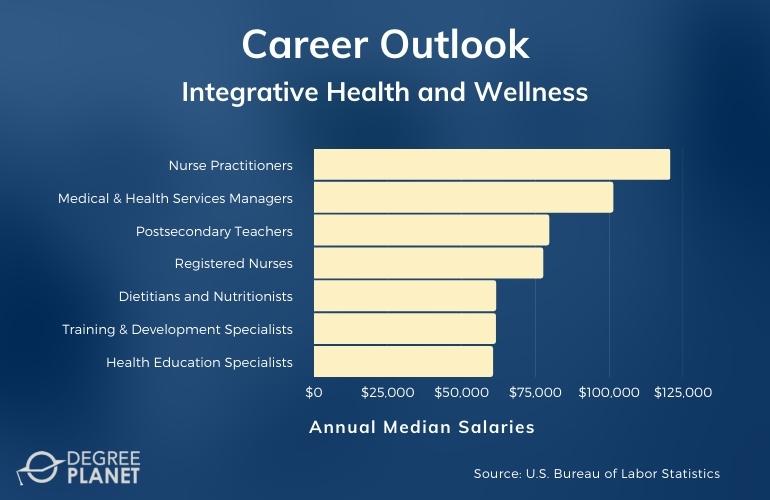If you’re interested in learning about a wide range of healthcare practices that assess patients from a holistic perspective, then you might consider earning a masters in integrative health.

In today’s world, there is increasing interest in looking beyond conventional medicine to help people’s well-being improve long-term. By pursuing a masters in integrative health, you can learn a multitude of ways to evaluate and treat your patients.
Editorial Listing ShortCode:
This online integrative health degree path can complement the work or practice of current healthcare professionals and practitioners alike. As the overall interest in integrative health continues to grow, so does the need for integrative health professionals.
Online Masters in Integrative Health Programs

The purpose of masters in integrative medicine programs is to teach students a variety of health and wellness modalities that they can incorporate into their profession. In these programs, you can learn to help others create life-long habits that improve their overall health.
Your curriculum may cover core topics like the fundamentals of integrative medicine, clinical research, and practical applications of integrative medicine. You’re also likely to learn about medical ethics and the business of integrative medicine.
Many integrative health programs are interdisciplinary and aim to combine medicine with other science-based health practices, such as:
- Nutrition
- Cognitive behavioral therapy
- Mind-body practices
- Holistic medicine
- Coaching psychology
- Neurophysiology
During your master’s in integrative health program, you may research the ideologies behind these healthcare methods to better understand them.
Editorial Listing ShortCode:
You may also attend classes that prepare you to apply these methods in your current profession. In addition to your classes, some programs involve completing a capstone project that allows you to practice how you would apply your coursework to your job.
Some masters programs are also designed to help you qualify for specified professional certifications, such as nutrition or health coaching certifications. While some programs focus on research, others emphasize relationship-building with patients to help make their treatment plans more effective.
Master’s programs in integrative health are generally intended for healthcare professionals who want to bring new methods into their practice. Typically, students who pursue this path are healthcare practitioners or have supporting roles in the healthcare field.
Apart from complementing a current profession, an integrative health masters may also prepare students to work as program developers, health educators, and integrative health care practitioners. Graduates can find jobs in a variety of sectors, including schools, hospitals, and other healthcare facilities. Establishing a private practice is an option for some professionals as well.
Integrative Health and Wellness Careers & Salaries

A master’s in integrative healthcare can lead to a wide variety of career paths, depending on your specialization and prior experience.
Many professionals who pursue a graduate education in integrative health already work in conventional medical roles, including physicians, physical therapists, and nurses. These programs can also be useful for athletic trainers, chiropractors, and massage therapists.
Those who want to work in healthcare support roles or education may pursue this degree as well. Some graduates go on to pursue positions as health and wellness coaches or as integrative health care practitioners. According to the Bureau of Labor Statistics, here are some of the career paths that could be associated with integrative health and wellness.
| Careers | Annual Median Salaries |
| Nurse Practitioners | $120,680 |
| Medical and Health Services Managers | $101,340 |
| Postsecondary Teachers | $79,640 |
| Registered Nurses | $77,600 |
| Dietitians and Nutritionists | $61,650 |
| Training and Development Specialists | $61,570 |
| Health Education Specialists | $60,600 |
| Athletic Trainers | $48,420 |
| Exercise Physiologists | $47,940 |
| Community Health Workers | $46,590 |
Common institutions for employment include hospitals, schools, and private offices. The type of roles you can qualify for depend on a number of factors, such as your prior experience and your previous education.If you wish to become a health practitioner, this degree may act as a stepping stone toward medical school or a professional doctorate for your preferred profession.
Editorial Listing ShortCode:
In general, healthcare professions are on an upward trajectory and are projected to grow by 13% over the next ten years. According to the Bureau of Labor Statistics, this will result in about 2 million new jobs.
Integrative Health Master’s Curriculum & Courses

During your masters program, you’ll likely take courses about different types of health and wellness methods. The classes you take may be similar to the following:
- Foundations in Integrative Medicine: You’ll study the background and structure of integrative medicine while learning how to apply that knowledge in your profession.
- Spirituality, Health, and Healing: This course will teach you religious and non-religious ideas about spirituality and how these concepts play a role in your health.
- Legal and Medical Ethics in Integrative Medicine: You’ll learn the legalities surrounding different areas of healthcare practices, including physician risk, consumer rights, and medical malpractice.
- Redefining Nutrition: This class will teach you to examine ideologies about nutrition from different cultural and dietary lenses, with the goal of broadening your perspective about nutrition.
- Holistic Living for the Caregiver: This course focuses on holistic tactics for healthy living, such as stress management and regular exercise.
- Traditional Healing Systems: You’ll learn about a variety of healthcare systems from around the world to expand your knowledge beyond US methods.
- Food Technology and Health: This class dives into the technologies used to make our food and teaches you to examine whether they are beneficial for your health.
- Ayurveda and the Mind: You’ll gain an understanding of Ayurvedic views and learn various Ayurvedic wellness practices.
- Practical Application of Integrative Medicine: You’ll practice using your knowledge of integrative medicine by creating a mock patient healthcare plan.
- Principles and Practices of Health Behavior and Self-Care: This course looks at different factors that affect a person’s health and teaches impactful self-care methods.
Many programs allow you to select your electives based on a chosen specialization, such as nutrition or mind-body practices.
Admissions Requirements

Integrative medicine schools generally want to see prior academic and professional healthcare experience from those applying for a master’s program. Although admissions requirements for masters in integrative medicine programs vary, here are a few you will typically see:
- Bachelor’s degree. Most masters programs require prior completion of a bachelor’s degree from an accredited school.
- Transcripts. Some schools require a minimum undergraduate GPA.
- Resume. Many schools want to see professional experience in the healthcare field.
- Letters of recommendation. Letters describing your academic or professional aptitude are often requested.
Other potential admissions requirements include a personal statement and specific academic coursework.
Accreditation

If a school is regionally accredited, it has met a specific set of predetermined standards for educational quality. You can find out if a school is regionally accredited on the US Department of Education’s website. Graduating from a regionally accredited school can be important when looking for future employment opportunities.
Editorial Listing ShortCode:
Many employers want to see that your graduate degree is from a regionally accredited school, and some employers will even do background checks to verify. Plus, if you need financial aid or want to transfer credits to a different school, you’re usually required to be attending a regionally accredited school to do so.
Financial Aid and Scholarships

If you’re needing assistance in paying for a master’s in integrative health, one option is to see if you qualify for federal aid as well as state aid.
Through the Federal Student Aid website, you can research federal aid options and apply by filling out and submitting the FAFSA form. Usually, your school will have their own deadline by which you must submit the form, and there are federal and state deadlines as well.
You may qualify for loans, grants, work-study programs, and more. For graduate students, one option is direct unsubsidized loans, where your school determines how much you can borrow based on your tuition. You can also explore scholarship opportunities, which are often offered by schools as well as outside organizations.
If you’re currently employed, you can check to see if your workplace offers any tuition reimbursement programs or development programs.
What Can You Do with a Masters in Integrative Health?

With a masters in integrative health, you can take your career to the next level by learning to assess health and wellness from a variety of perspectives.
Depending on your prior degrees and experience, you may qualify for a variety of roles in the healthcare field. Many graduates work in schools, hospitals, and private practices. Practitioners often pursue a masters in this field in order to incorporate integrative health methods into their practice.
An integrative health masters is also beneficial for other health professionals, such as administrators, consultants, personal trainers, and health education specialists. Graduates may also go on to pursue certification as health and wellness coaches.
How Long Does It Take to Get a Masters in Integrative Health Online?

A masters program generally takes 1 to 2 years to complete. The amount of time it takes to complete a master’s in integrative health depends on the curriculum length, program requirements, and whether you are attending classes full-time.
You may be able to complete a masters in just 1 year if you’re in a 36 credit program with no thesis required, provided you are enrolled full-time and take summer courses. It may take longer to graduate if you are required to write a thesis or are enrolled part-time.
What’s the Difference Between a Masters in Functional Medicine vs. Integrative Medicine?
Integrative medicine looks at a variety of perspectives to determine how to heal a person long-term, while functional medicine focuses on finding the root cause of a person’s health issues. While pursuing a masters in integrative medicine, you may learn to:
- Consider multiple systems to determine the best path for each patient
- Create long-term treatment plans for whole body health
In a functional medicine program, you may learn to:
- Identify patterns in a patient’s medical history
- Determine how and why an illness occurs
You might prefer studying integrative medicine if you’re looking to take a holistic approach to patients’ health.
Is a Masters Degree in Integrative Medicine Worth It?

Yes, a masters degree in integrative medicine is worth it for many students. According to the Bureau of Labor Statistics, many positions associated with integrative medicine are predicted to grow significantly over the next ten years.
The demand for healthcare occupations overall is expected to increase by 13%, which is much faster than average. A masters in integrative medicine is also a flexible degree that can be applied to many different roles in the healthcare field. This area of study can be a benefit for practitioners and health professionals alike.
Editorial Listing ShortCode:
Some graduates also go on to work as health and wellness coaches, health administrators, or health education specialists.
Universities Offering Online Masters in Integrative Health Degree Programs
Methodology: The following school list is in alphabetical order. To be included, a college or university must be regionally accredited and offer degree programs online or in a hybrid format.

Creighton University offers a Master of Science in Integrative Health and Wellness. The program is designed to prepare students to serve as valuable members of healthcare teams. The program consists of 36 credit hours. Courses cover concepts like lifestyle medicine, health coaching, stress management, nutrition, and exercise.
Creighton University is accredited by the Higher Learning Commission.

Drexel University offers a Master of Science in Complementary and Integrative Health. Many graduates pursue careers as consultants, educators, integrative healthcare practitioners, hospital administrators, and program developers. The program spans four 10 week quarters for a total of 45 credit hours. Students can attend class using a fully online learning format.
Drexel University is accredited by the Middle States Commission on Higher Education.

The Master of Science in Health Sciences program at George Washington University offers a specialization in Integrative Medicine. The program aims to teach students the essential skills needed to succeed in a variety of healthcare and wellness professions. Classes are offered 100% online. On average, full-time students can complete the program’s 36 required credits in 30 months.
George Washington University is accredited by the Middle States Commission on Higher Education.

Georgian Court University offers a Master of Arts in Integrative Health. Potential courses include Humor and Healing, Ayurvedic Approach to Mind-Body Healing, and Eastern Approach to Nutrition. Most students can complete this 36 credit program in 1 to 2 years depending on their chosen course load. Students can choose to attend classes either fully online or fully in-person.
Georgian Court University is accredited by the Middle States Commission on Higher Education.

The Master’s in Mental Health and Wellness program at Grand Canyon University offers a concentration in Integrated Health. The curriculum emphasizes the importance of collaboration and communication to support clients’ holistic wellness. The program requires the completion of 34 credits, and each course is 8 weeks long. Students can choose to attend in an asynchronous, online format or an evening, in-person format.
Grand Canyon University is accredited by the Higher Learning Commission.

Logan University offers a Master of Science in Integrative Pediatrics. This program is intended for doctors or students in the chiropractic discipline wanting to advance their skills in working with children. The curriculum is designed to be completed in 2 years of part-time attendance. Classes are offered primarily online, but the program does require an annual session on-campus.
Logan University is accredited by the Higher Learning Commission.

Maharishi International University offers a Master of Science in Maharishi Ayurveda and Integrative Medicine. Classes cover topics like herbal supplementation, meditation and mindfulness, pulse diagnosis, and dietary and lifestyle recommendations. This program uses a part-time, 100% online learning format. Typically, students can complete their studies in 3 years.
MIU is accredited by the Higher Learning Commission.

Maryland University of Integrative Health offers a Master of Arts in Integrative Health Sciences. Students can tailor their studies to their professional goals by specializing in Integrative Nutrition, Herbal Medicine, Health Promotion, Mind-Body Self-Care, or Whole Medical Systems. Most students can finish this 30 credit program in five trimesters, or 1.5 years.
MUIH is accredited by the Middle States Commission on Higher Education.

Northwestern Health Sciences University offers a 100% online program for a Master of Science in Functional and Integrative Nutrition. Students who are passionate about providing holistic care through the use of diverse and evidence-based strategies may find a great fit in this program. Topics of study include behavioral design, research evaluation, medical technologies, health coaching, and business management.
Northwestern Health Sciences University is accredited by the Higher Learning Commission.

Ohio University offers a Master of Integrated Health Studies. The curriculum combines interdisciplinary studies to educate students who may serve as healthcare advocates with a holistic care mindset. The program offers concentrations in Veterans Health, Health Policy, Global Health, Healthcare Leadership, and Clinical Informatics. All 33 required credits can be completed online.
Ohio University is accredited by the Higher Learning Commission.

Saybrook University offers an online program for a Master of Science in Integrative and Functional Nutrition. The curriculum seeks to teach students the importance of biology, environment, and behavior in affecting health and wellness. On average, students can complete their requirements in 28 to 32 months. The program requires the completion of 39 credit hours and does not require a thesis.
Saybrook University is accredited by the Senior Commission of the Western Association of Schools and Colleges.

St. Catherine University offers a Master of Arts in Holistic Health Studies. Graduates often pursue careers as naturopathic physicians, orthoptists, acupuncturists, or health education specialists. Students must complete a minimum of 39 credits while maintaining a 3.0 GPA or higher to graduate. Full-time students can typically finish in 2.5 years. Part-time students have varied finish times based on their course loads.
St. Catherine University is accredited by the Higher Learning Commission.

Thomas Jefferson University offers a Master of Science in Integrative Health Sciences. Potential courses include Mindfulness-Based Stress Reduction, Mind-Body Practice, and Integrative Nutrition. The program consists of 10 courses that are housed entirely online. Full-time students can usually finish the program’s 30 required credits in 1 year, though part-time schedules are available.
Thomas Jefferson University is accredited by the Middle States Association of Colleges and Schools.

The University of Minnesota offers a Master of Arts in Integrative Health and Wellbeing Coaching. Many graduates have pursued roles promoting wellness in settings like hospitals, community centers, schools, and clinics. The program requires the completion of 38 credit hours. All classes utilize a hybrid learning format, blending online courses with two in-person weekend intensives per quarter.
The University of Minnesota is accredited by the Higher Learning Commission.

The University of West Georgia offers a Master of Science in Integrative Health and Wellness. Students can select an additional emphasis in either Health and Wellness Coaching or Lifestyle Medicine and Integration. The curriculum consists of 30 required credit hours. Convenient online coursework is complemented by valuable hands-on clinical experiences in the field.
The University of West Georgia is accredited by the Southern Association of Colleges and Schools Commission on Colleges.
Getting Your Masters in Integrative Health Online

You might consider pursuing a masters in integrative health if you’re interested in learning about healthcare modalities beyond conventional medicine.
Healthcare is a growing field, and the demand for professionals with integrative health expertise continues to grow as well. These programs can teach you about nutrition, holistic methods, medical ethics, and more to help you bring your career to the next level.
If you want a flexible option, you can consider enrolling in a health services degree online program. They tend to offer courses that can be taken at night or at your own pace. You can start your journey toward a masters in integrative health today by exploring accredited universities.

